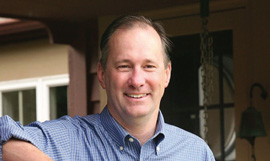Now let’s think about how unreasonable this is. There is a branch of civil engineering called traffic engineering, which concerns itself with the safe and proper flow of traffic–the use of stoplights, speed limits, roundabouts, passing zones, traffic signage, anything at all to do with automotive, bicycling, and pedestrian traffic. These are people who go to college and graduate school and have worked on these matters for decades, who live and breathe traffic design, and a half dozen times every day I think I know more about traffic than they do and curse them under my breath.
A few days later, I was reading about something called the Dunning-Kruger Effect. This is a phenomenon in which people think they’re smarter than they actually are. And here’s what psychologists have observed—the less people know about something, the more likely they are to think they’re brilliant at it. They don’t recognize their lack of ability. This is called the Dunning-Kruger Effect. People cannot objectively judge or assess their competence or incompetence. The philosopher and mathematician Bertrand Russell was describing this trait when he said, “One of the painful things about our time is that those who feel certainty are stupid, and those with any imagination and understanding are filled with doubt and indecision.”
We’ve been talking about the missing fruits, the spiritual fruits the Apostle Paul should have mentioned, but didn’t. Thus far, we’ve discussed curiosity, knowing-when-to-hold-em-and-when-to-fold-em, awe, courage, truthfulness, and enthusiasm. This morning I would like to add self-awareness to our list of spiritual fruits: the ability to accurately assess one’s own abilities, motives, and emotions, and how they influence one’s behavior. So when we say someone lacks self-awareness, what we’re really saying is that they can’t or don’t understand the truth about themselves, and that their lack of self-knowledge has negative consequences in their relationships and endeavors.
This is why if you’re an alcoholic and you go to AA, you must begin every meeting by telling everyone your name, then saying four words to remind yourself who you are and what brought you there. Do you know those four words? And I’m an alcoholic. So the meeting begins with a demonstration of self-awareness. It’s why, when you seek counseling, the therapist asks you, “Why are you here?” When I went to Laura for counseling that was the first question she asked me. In part, she was evaluating my self-awareness. If I had said, “Because my wife’s making me,” Laura would have rightly discerned I had self-awareness issues. But when I said, “Because I’m suffering from depression and I don’t know why,” Laura knew I’d begun the journey of self-awareness and was ready to explore. Eventually, through persistent, unflinching self-examination, taking full responsibility for my emotions, we discovered the source of my depression was other people.
When I was a child in the Catholic Church, I had to participate in confession once a week. Every Saturday night, I would step into the confessional, reflect on my week and tell the priest about my less stellar moments. He would offer suggestions about how I might do better, then I would pray. I didn’t realize it then, but looking back on it, I realize it was a lesson in self-awareness. Once a week I had to reflect on what I had done and who I was becoming. So I was being trained in self-awareness.
I can’t count the times I’ve sat in Quaker silence and have had an insight into my conduct or character that inspired me to change, something I likely never would have realized except through self-examination. Has that ever happened to you? You’re sitting quietly and a door swings open and you step through it and are faced with a great truth or insight about yourself. Sometimes that insight is an occasion of great joy and sometimes it is an occasion of deep pain or struggle.
When Jesus left home, the gospels of Matthew, Mark, and Luke tell us he went on a journey to the wilderness and faced three temptations. But it wasn’t so much a journey into the wilderness, as it was a journey of self-awareness. First, Jesus was tempted with the power to turn stones into bread, an appeal to live for the body. Then he was tempted with the power to rule the world, an appeal to live for authority. Finally, he was tempted with the power to leap from the Temple and be caught by God’s angels, which is an appeal to summon divine power. These three powers were real temptations for Jesus. He was drawn to them. There was something in those powers that appealed to him. That is the nature of temptation. I eat lunch with Don Adams and Randy Horton every Wednesday and they order liver and onions, and I’m never tempted to order them. They are no temptation at all. But Jesus was very much attracted to these powers. They tempted him. And his response was rooted in his self-awareness. This is not what I’m about. This is not who I am.
Polonius, in Hamlet, said “To thine own self be true.” But let’s take it just a bit further and say, “To thine own self be truthful.” Discover what you are about it and stick to it. Face the truth about yourself, because growth is never possible without self-awareness. Live with confidence, yes, but do not for the sake of your ego claim expertise in things you know nothing about. Recognize there are people who have dedicated their entire lives studying matters you have only given passing thought to, and listen to them. Bear in mind that we are not always accurate judges of our own competence. Discern your priorities and be faithful to them. To thine own self be truthful. Because if we get in the habit of lying to ourselves, we will soon be in the habit of lying to everyone. To thine own self be truthful.

